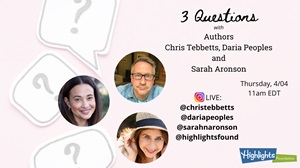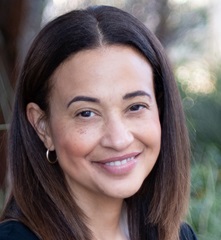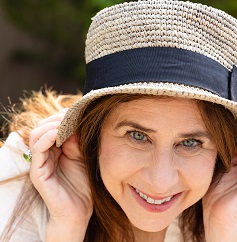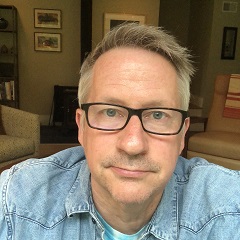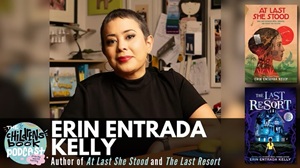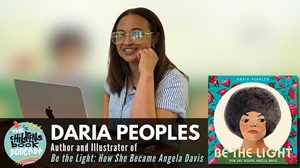(Please note: closed captions are being added to the video below. When they are finished, you can see them by hovering over the bottom of the video and choosing the “CC” icon.)
Full Transcript:
Cat:
A big hello to our Highlights Foundation family. We’re so happy to have you with us here today. For those that may not know me, I’m Cat Galeano, my pronouns are she/her. I’m the social media manager at the Highlights Foundation, joining you from Westchester, New York on the traditional lands of the Seewanoy people. Apart from all the very fun things I get to do at the Highlights Foundation, I am also a writer and a reader who is very excited to welcome our friends and faculty Sarah Aronson, Daria Peoples and Chris Tebbetts. They are the team behind Just Do It! Your Collaborative Support Group for Finishing Your First Draft, spring and summer edition, starting on April 17th.
But before we dive in, I just wanted to remind our viewers that joining in on any Highlights Foundation sessions, to do so with no hate, no harm and no harassment of any kind. And now let’s get started. So my very first question is, can you remember a specific time in your own creative journeys that a draft was really tough to complete? Can you describe that experience and what helped you get to the finish line?
Daria:
So I’ll go ahead and jump in and answer that first. Well, let me begin by saying that every first draft I’ve ever had has been challenging. But I think the hardest one was my very first one that I wrote for my debut picture book. It took about thirty years to get that first draft and I think that there are less than 200 words in the book. But I think back on that time and looking over it and I think some things that helped are #1: I knew it was telling the right story. I think that’s really important. I hadn’t written anything as good as that. But if this needed to be molded and the first…was much more purposeful than the original idea was. I think the second thing that really, really helped was that I was patient. I learned how to be patient with myself and also the people who were helping me with the first draft. I think you know sometimes we get so impatient when we send something to someone and we want their feedback right away and they’re trying to feed their children or something. So we have to be patient with ourselves and with the people who are part of our creative journey. And I think the last thing is just the faith that if I just kept going that everything was going to work out.
Cat:
I love that. Thank you for sharing.
Sarah:
I could not agree more on all of those things like first: could you teach me a little bit about patience? But also: faith that you’re in the right place. Faith that you’re on the right journey. Faith that you are the person to to tell the story. And when you’re in community, you get that faith because you have other people boosting you up. And it’s so important that none of use feel like we have to do this alone.
Chris:
And could I just jump in and if add that anybody’s familiar with this course that we’ve done before, Just Do It. What’s brand new this time around is Daria’s presence as an illustrator. We’re adding a whole new layer to the course. We’re really excited about that. Thank you so much for being with us on this one, Daria.
Daria:
Yeah, absolutely. I’m excited to join.
Cat:
Thank you for also sharing that the first draft, no matter if it’s your first story that you’re kind of cranking out, or if it’s your 20th story. Thank you for sharing that. All of that is really hard. Like no matter what process you’re in it. Still, still really hard just to get started, which why we encourage all of you to, you know, sign up if you want to get that draft done.
Sarah:
Reaching a draft is all about taking chances, and taking chances is hard. But when you have a circle of friends around you, taking chances feels like a fun dare. Or maybe less scary.
Cat:
I love that! Fun Dare. Ooh, I love that. You know what I’ve been thinking actually, that I have this draft that I’ve been working on, where I’ve kind of just kind of been tinkering and I’m like maybe I should just be like a ghost student in this class and just sort of audit it and just like get my draft done because like the whole outline is written but you know, I kind of need great support…
Daria:
Come on, Cat.
Cat:
You know what? If you see my my ghost name just there. Just know that I’m I’m also there, but you know not there.
Sarah:
Don’t forget: Everything is Just Do It.
Cat:
You might see me on April, so. But my second question is, Chris, I love the blog that you wrote for us last year about shifting negative self talk to constructive ideas in order to make progress. We’re all guilty of that negative self talk sometimes, but I love that this course really focuses on positivity and consistency to move forward. Can you tell me about how positivity and play is part of your own personal beliefs? And this one’s for all of you.
Chris:
Sure. I am a real pragmatist. So anytime I run a workshop, anytime I go to a workshop, I want take away tools and I want the things that we’re doing to be for a reason and a reason that feeds the story that I’m working on. So I’m very practical about the idea of maintaining a positive mindset and talk about the, in that article you referenced, I talk about the what I call the “Reverse Golden Rule.” Which is to say, it’s very easy for us when say a friend comes and says I’m having a hard time with a draft, to be encouraging–even honestly encouraging, I’m a big fan of of clear-eyed optimism, as I call it, you know, which is to say not, not putting on the rose-colored glasses, but being practical about the way positivity can help us get the work done.
And we can tend to–a lot of writers can tend to–not give ourselves the same consideration. So there’s something very practical about being a friend to ourselves in the process, while at the same time I am the guy who also–sometimes we hear people talking about like oh, I’m not getting enough work done, I don’t know why I don’t get the writing done, and the response very often is “take it easy on yourself.” I’m not always gonna say that. Sometimes, you know, as I say in that article, slso, a great coach that will push somebody, but they will, they will will be tough, but they will never make it personal.
So the goals in, that we build into this class are never about, you know, improving ourselves as productive people or as writers so much as it is about things that we can do. Can we set a certain amount of time or number of pages? Can we, you know, work together as a community to figure out ways to sort of hack into our own productivity? Like the, the writing sprints that we discovered last year with Just Do It. We do these, you know, one hour every day on Zoom writing sprints. And I haven’t even begun to talk about play, but Sarah is actually the play mate so I’ll let her pick it up.
Sarah:
Play is the way. I will say it ten thousand times. I cannot wait to sit in on Daria’s studio workshop and pick up my pencil and my paintbrush. And one of the things that I have realized about play for me is that play is an act of defiance. It’s an act of no expectations! It means I am going to intentionally make this work fun. And so I am an explorer, I experiment and I’m going to ask all of you to do that with me. And actually it’s, that is, when we get away from our concerns and our fears, when we don’t let fear ride the bus, as it so often does when we’re always looking on social media. I am guilty.
That when we can play, when we can access that child’s eye, that spirit of exploration and discovery. Then, oh my God. Everybody starts finding new ideas and we lose that vulnerability and amp up the willingness to try new things. And for me that is, that’s like, that’s gold in this group. Because we’re all doing it together. In those sprints, in the brainstorms, in the discussions, all these kind of things that we’re going to do. We say yes to everything. Warning: we say yes!
Daria:
Yeah, play looks different to everybody in a different way. I think you have to find, you know, what kind of play you like. I think that it’s a challenge for artists to find things that feel playful if they’re not working to create something that you know… if they have like pre-designed and their ideas already, they have their medium that they like, you know, so I even have to encourage myself to go outside my comfort zone when it comes to mediums and that sort of thing. I also think play includes taking walks and doing yoga and you know, maybe exercising. I think play if you are a painter, maybe it’s putting hands in clay. If you are a writer, you know, maybe it’s taking out the watercolors and crayons and and drawing. So I do think that we have to allow ourselves time to play. We don’t always think that might translate into something on paper. And that’s the misbelief that we have to disregard. Because for opening up new spaces in our mind, new ideas and…you might not be making the connect immediately. But you will see them come into fruition at some point during your draft.
Cat:
That’s amazing.
Chris:
I’m going to second the dancing in the comments. I think part of what I’m hearing in Daria is you know, dancing around the house, which I do a lot as part of my creative process. It lets us let go of the need to be attached to the outcome and if we can then bring that to the page or to the canvas, that same mindset, so it’s a great translation.
Sarah:
Dancing also helps you like, key into the moment and you’re in JOY. And when you’re feeling joyful, you’re gonna feel more confident. And then you’re going to try new things. I always try every year I make a goal to do one thing that I think or that I know I’m going to stink at, because that takes all the pressure off of me and I find those creative pursuits to lead right into discovery and epiphany. Yeah.
Daria:
Well, we might have some dance breaks then, or some dance offs.
Chris:
Always.
Cat:
I love that idea. And just for those that are wondering the article that Chris was mentioning: it’s one of our blog posts, so I’ll make sure to put that on our website and our socials. Not our website, our socials. So just so everyone can find it easily. But I just loved everything you commented on today. And yeah, writing is such a lonely thing. So the fact that this group exists and that we’re there to cheer each other on and hold each other’s hands and really kind of get messy and get that first draft done because it is supposed to be messy. It’s just we need to get it to the end.
And I think, personally speaking, as a writer…cause for those that may not know, I’m also, you know, obviously, you know, I get to work at Highlights. But I’m also a writer and then my background is also journalism, so I used to write for TV. That was part of my background background but I am just so kind of illusion with the idea of of joining this group because this draft that I’ve had–the outline has been ready for so long, but every time I go to sit and do it, I’m just kind of like, ah, maybe I’ll just like delete the word again and go back and then, you know, and then I, I don’t move forward. So it’s like the forward, the momentum, that’s what I need. So I feel like me as the writer speaking to all of you writers and and illustrators and people wanting to to do the thing.
You know what? If I’m encouraged, I think this should encourage all of you too. And my third and final question, which I’m so sad we’re coming to the end already, is: this class has a Discord group as a component. Which of course is optional, but also different for most of our classes. What goes on in the group and how do people use it as a tool for the course?
Sarah:
So I’m going to answer this question in a couple of different ways. One: yes, it’s optional and if all you need for your process right now is to listen to lectures and get the writing prompts that happen on the Canvas classroom, that’s great, but I’m going to dare everyone to take a step forward. I know technology is thinking, I know it can be an obstacle. I know it can trigger your vulnerability. We will help you. We’ll help you get on the Discord board because this is what happens on the Discord board: Conversation. That’s not time specific.
Most classes that I take or teach look like a triangle. The teachers at the top and everybody else is underneath. But this class is a circle and so the best way to join that circle is to get on that Discord board where we’re going to be talking about all kinds of things and scheduling things that you want. You can bring up anything on that Discord board and your peers as well as I will be able to answer and encourage you. When you are on that board, you might feel vulnerable. Well, we are vulnerable all the time. But you, but you’re not going to be alone anymore. You’re going to have lots of people who are going to be able to brainstorm, talk about books, talk about writing, talk, um, do the prompts, do book talks, whatever it is that fuels your process. So. Yes, tech, just that. Just ask for help. Rest. Join the community, be part of the circle. This is why the Discord board is just magic in this class. There are so many people who have taken this class who have established lifelong friendships because of the work that they’ve done and the openness that they have felt and experienced and contributed. You know everything we know. You are writers. You are illustrators. You are creative people and artists. Please: we need, we need you. Join in.
Cat:
And if anyone wants to add to that?
Chris:
The only thing I, I can think to add to that is that we also create accountability pods as we call them. Small groups within the course, and another thing that discord allows us to do, is to create private rooms for affinity groups or accountability pods. People who can, within the course, private conversations on the Discord as well.
Daria:
I’ve never been on Discord before. So I’ll be a brand new person with all the others that are brand new. But I’m looking forward to I think the most important thing–well, when you’re doing the first draft–is there has to be some level of commitment that you’re going to make this the main thing in your work for this season, like oh, it can’t be the 4th or 5th priority on your list. It needs to be 1 or 2 on the top of the list. And I think having access to people 24/7 helps that process. If you are really setting this side this time aside to to finish this draft.
Sarah:
I love that. Beautiful, that’s beautiful. Really. Let’s put our commitments together. Let’s, let’s go for it. I’m psyched.
Cat:
Let’s make it, let’s make it our priority this season. I love that. And it almost like the Discord, it makes the the class and the group a little more 3D because it’s almost like you have access to each other a little bit more than like the timed, you know, Zoom meeting every week and whatnot. So I love that, that this, that the Discord oomponent is part of this class. Well, that is all my questions. Is there anything you’d like to add before we wrap up?
Chris:
I, you know, I’m not, a big, like a lot of writers, I’m, I don’t love to to..ot my own horn, but I’ve never taught something. I’ve taught a lot at Highlights and I’ve never taught something, taught something before that really gets at the: we can talk about writing all we like, but we still gotta get the butt in chair. And if I’m being honest, I’ve never seen a class that really helps people do it the way this one does.
Cat:
Oh, wow.
Sarah:
Bet on yourself. Bet on yourself, people. Believe in yourself. Trust yourself. Trust others. This is, this is where we can get the work done.
Daria:
Yeah. And we’re not, we’re not asking you to do anything that we’re not asking ourselves to do. We’re right there in it with you. You know, I’m starting a new draft of a new project and so I want to go through those growing pains with you and I would like to finish. That’s my goal. I want to do that, so I want people to join who want, and have the desire to finish, yeah.
Cat:
Well, I’m already hooked. I’m just going to have to tell programming that they might just have an extra, extra little, little box on that on that Zoom journey starting soon. So I may I may just see you in a couple of weeks, because I have that draft and I need to get done. So if you’re not encouraged by this, I don’t know what’s going on because I am super encouraged by this so. But if you’d like to learn more from Daria or Chris and Sarah, along with special guests Meera Trehan and Jamie Adoff, please make sure to sign up to Just Do It! Your Collaborative Support Group for Finishing Your Draft, starting on April 17th. You can register on our website highlightsfoundation.org and lastly you can purchase Chris, Sarah and Daria’s Books at our Virtual Bookshop, powered by bookshop.org. Thank you, Sarah. Thank you, Chris. Thank you, Daria, for joining us today and we cannot wait to see you online and on the Discord.



